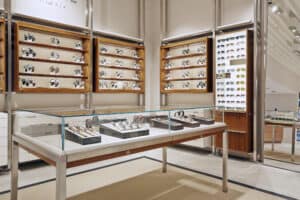The dictionary definition of a fossil is “the remains or impression of a prehistoric plant or animal embedded in rock and preserved in petrified form, a person or thing that is outdated or resistant to change, or a word or phrase that has become obsolete.”
It is therefore perhaps surprising to see the name on a twenty-first century high-end, high street retail fashion accessory brand. However, although it may be called Fossil, it is far from a dusty relic with retail practices dating back to the Jurassic period. Indeed, although it takes its inspiration from a commitment to American vintage products, the watch company has made time to develop its future retail strategy, and rather like a T-Rex, Fossil has proved itself fearless in the face of new challenges. This includes the movement toward omni-channel and being among the first European fashion brands into territories such as South Africa, India, and Korea, with all the LP challenges that inevitably present.
Founded in 1984 as a wholesale business, largely in department stores where its iconic vintage look started to get noticed, Fossil began its retail journey in 1996. Its first European store was in the Netherlands, which catapulted the name across Europe, first into the UK and then Germany where its European distribution center is located.
Based out of its global headquarters in Richardson, Texas, just north of Dallas, Fossil today retains its foothold in department stores across Europe, such as House of Fraser in the UK, Printemps in France, and V&D in Benelux. But it has developed its own strong retail presence globally, with an  impressive estate of more than 600 retail locations, 1,000-plus concession and consignment locations, and over 15,000 employees worldwide.
impressive estate of more than 600 retail locations, 1,000-plus concession and consignment locations, and over 15,000 employees worldwide.
Multi-Brand Offering
Running in parallel with the Fossil brands is Skagan, the Danish watchmaker that Fossil purchased in 2011. In addition, the company is constantly building its multi-brand portfolio by making watches for the likes of Michael Kors, Burberry, DKNY, Armani, adidas, and many more top designers and selling them through its wholesale business and retail Watch Station concept.
This global presence has allowed for sustained growth, which has propelled Fossil into the Standard & Poor (S&P) 500 listing, marking its place among the leading publicly traded companies in the United States. But Fossil is not about marking time and resting on its laurels. New global markets and channels are in its cross hairs as well as the company’s unstoppable march into the wearable technology market. It recently acquired the U.S.-based Misfit, a technology company that has manufacturing locations in San Francisco, Vietnam, and China to help build upon Fossil’s already sizeable foothold in this emerging market.
Challenges
Meteoric growth also requires global risk strategies. A brand may burn bright in its ascendancy, but the smart money in retail growth is on preventing the fall out from a burn out and the kind of meteor showers that allegedly wiped out the dinosaurs in the first place.

David Lawwill is the global director of Loss Prevention for Fossil Group who along with David Hill, Fossil’s senior LP manager for EMEA (Europe, Middle East, and Africa), form the first line of defense as the company ventures into new territories, whether it is new strategies like omni-channel or previously unchartered physical territories such as South Africa, Korea, and India.
So how do you stop yourself getting burned? Well, it seems, the first rules are time and honesty. They were under no illusions entering the South African market where the murder rate increased by 1,000 deaths during 2014.
Street or public robberies increased by 8,598 cases to a total of 69,074 incidents, and this is 14.2 percent higher than the 60,476 incidents recorded the previous year.
During this period, business robberies increased by 13.7 percent to 18,615 incidents, a crime that has consistently increased in the past eight years and is 461 percent higher now than it was in 2004–2005. The statistics reveal that there were an additional 2,238 armed attacks on businesses in 2013–2014 compared to the previous year.
“We have learned the hard way in certain territories and that you can never go in fully prepared, but we do extensive research on new markets and make recommendations to the business based on our due diligence as well as benchmarking with other retailers in the market to see where their pain points are,” said Lawwill.
 “You have to work with local managers to help them understand what the loss prevention culture means to the business. It takes time—some have never worked with or even heard of loss prevention before. Prior to legislative changes a couple years ago, you simply could not do business in India as a foreign company. Those changes open up the doors for foreign brands to business without a local company partnership. It’s Fossil that has to establish the relationships with local managers to understand their business and how to protect the assets.
“You have to work with local managers to help them understand what the loss prevention culture means to the business. It takes time—some have never worked with or even heard of loss prevention before. Prior to legislative changes a couple years ago, you simply could not do business in India as a foreign company. Those changes open up the doors for foreign brands to business without a local company partnership. It’s Fossil that has to establish the relationships with local managers to understand their business and how to protect the assets.
“We knew South Africa would be challenging, so we built in additional security in terms of physical security controls, but you also have to allow for the fact that people will come into stores in broad daylight and rob staff at gunpoint. It is a unique market where there is a distinct separation of the classes, and townships sit cheek by jowl with malls. There is no middle class, and the price of one of our watches could be a month’s salary to many people living there.”
This is one of the reasons why South Africa has one of the highest murder rates in the world, but local partnerships working with Fossil’s alarm vendor and its retail response team has helped pave the way for safe and prosperous trading for Fossil in Africa’s southern cape.
Violence is such a run-of-the-mill and daily routine in South Africa that Fossil really had to adjust its model to manage issues never-before seen at the company. Although it has been operating in the US for more than twenty-five years, during which time it only saw one armed robbery, six months into its expansion into South Africa Fossil had already experienced multiple armed robberies.
But that is not the end to the differences and the complexity of the relationships with law enforcement. Fossil, like other retailers in South Africa, cannot enjoy a direct relationship with the police.
Instead, it must operate through private security partners that, like the criminals they fight, are armed to provide the first line of response before cases are reported to law enforcement.
“Our contract is with the alarm companies, who deploy armed response teams to alarm events, as opposed to the police,” added Lawwill.
Other alliances have also helped the bedding-in process. In South Africa, Fossil recently purchased a majority share in S. Keren, its South African distributor, to operate more than thirty retail locations and all wholesale operations across southern Africa.
“As with any business acquisition or joint venture, there are challenges with ensuring that reporting is standardized and equitable to the rest of the chain, so we can be sure that we are interpreting inventory results accurately,” said Lawwill.
The Indian experience for Fossil, which has fifteen stores across the sub-continent, was very different. Although one of the biggest populations in the world at 1.6 billion with a high murder and violent-crime rate, retail crime is seen as more passive and focused more on fraud.
“You usually end up one step behind the bad guys, so local knowledge is critical. Each country is a separate business entity and has its own management team that has key insights into the cultural norms and retail trends of that market,” added Lawwill.
“By the continuous benchmarking of best practices and maintaining our strategic partnerships we can hope to keep up with trends and develop the right solutions for the business and stay effective in emerging markets like South Africa, India, and Korea.”
Technology and Omni-channel
With the acquisition of Misfits, Fossil is likely to morph in shape, in line with many retailers according to Lawwill. It will retain its heritage business  but expects to see a higher percent of sales in the wearable tech product categories. Striving to provide an omni-channel experience to the customer will change the way retail groups build bricks and mortar and ensure delivery of purchases in the most efficient and expedient manner.
but expects to see a higher percent of sales in the wearable tech product categories. Striving to provide an omni-channel experience to the customer will change the way retail groups build bricks and mortar and ensure delivery of purchases in the most efficient and expedient manner.
“In 10 years’ time, we might be seen as more of a technology company than a fashion or accessory brand. That will mean many changes in the way the global risk is evaluated and loss prevention strategies are managed as much of our focus could be on the integrity of the supply chain and inventory availability,” Lawwill said.
“Stores will become more focused on providing an experience with devices such as touch screens, mobile POS, and contactless payment across our global estate—first the US and then Europe and Asia-Pacific.”
Lawwill admits that everyone is waiting to see how omni-channel plays out, but the customer experience will determine its success or failure. Although like trading in new territories, the Internet is still a foreign country to many heads of LP who often see the threats before the ink is dry on the marketing literature.
“It is all about the customer journey and getting the goods to the customer as fast as possible, and as a tech-savvy brand with a heritage in wholesale, we are well placed to succeed here as we are well on our way to the omni-channel fulfillment.
“However, from an LP perspective, conceptually, omni-channel will produce fewer B- and C-level stores and focus more on flagship locations whilst making a priority of logistics because that is where the challenges will be—in efficient distribution of the product.”
Terrorist Threats
Recent events in Paris have proven that the threats are closer to home, and part of the broader EMEA task has extended to a crisis management role at all of its major stores.
During the first quarter of 2016, the team has been conducting threat assessments to identify those locations most at risk and conducting detailed security checks to determine if additional security measures should be implemented.
“Crime rates do not drive where we put stores, but we do carry out thorough risk assessments and taker a wider look at what stores face and the types of risks—like Paris. Included in that risk assessment is asking the question: what could we do better to protect our associates and customers if a similar event were to occur in or around our store?”
“Therefore our threat assessment uses the best intelligence from agencies such as the FBI and Interpol, and we are looking at how we can improve on what we have to protect high risk locations. We are looking at the issue of reinforced glass that is bomb proof, for example, and how we ensure that staff have somewhere safe to go if an event of this type should take place—such as a protected back room, for example.”
Time Is Money

With the broader EMEA role, Hill and his team of regional LP managers and distribution and logistics security experts have to constantly explore up-and-coming threats to their supply chains as demand for the product increases. Getting the time pieces to market faster has become a business-wide priority.
The brand has a massive production capability coming out of China and Japan with more than 1,000 component suppliers to feed demand, although Fossil still manufactures its Swiss movement time pieces in Switzerland and has its EMEA head office in Basel. Consequently, getting product to market in an expedited fashion in line with the omni-channel aspirations is part of the broader challenge.
Trade in the Middle East presents a lucrative proposition, and Fossil is bringing its products to market through the franchise model. David Hill, an experienced retail loss prevention practitioner who has worked for Fossil in an international role for the last eight years, has helped write the compliance manual for franchisees operating in these territories.
Europe
Although Fossil is a global company operating in over 100 countries, growth in Europe is out-pacing all other regions, and the brand has recently  opened an office in Poland solidifying its push into Eastern Europe. Again, operating in different western territories presents its own closer-to-home opportunities and threats. In one of Fossil’s largest markets, Germany, where its massive European distribution center is located, the company, like every other ambitious retailer, has to run its ideas through the approval process of a works council. These are full-time elected regulatory bodies that have a democratic voice within the business, but can also present business-wide and LP challenges. Dialogue with the works council is essential to getting on in business in terms of the location of CCTV, data protection, and HR issues.
opened an office in Poland solidifying its push into Eastern Europe. Again, operating in different western territories presents its own closer-to-home opportunities and threats. In one of Fossil’s largest markets, Germany, where its massive European distribution center is located, the company, like every other ambitious retailer, has to run its ideas through the approval process of a works council. These are full-time elected regulatory bodies that have a democratic voice within the business, but can also present business-wide and LP challenges. Dialogue with the works council is essential to getting on in business in terms of the location of CCTV, data protection, and HR issues.
“We work closely with the works council, but there is an issue of slowing things down and complicating the process, and consequently decision making becomes more difficult,” said Lawwill.
The loss prevention team is practical in size and continues to grow with the business. It has the security team in addition to the core field regional LP managers, but additional skills will be needed as the brand pushes deeper into new territories.
New territories also mean a rise in organized retail crime (ORC) that has also made an appearance on the Fossil radar, and these threats are both  physical and online.
physical and online.
“We have definitely seen a significant rise in ORC activity, in both the Americas and EMEA. This is a new challenge for Fossil having not experienced organized retail crime in the past, which goes hand in hand with brand recognition and black market value,” added Lawwill.
In terms of the latter and the omni-channel strategy, it may indeed be the case that more intelligence-led analysis is required to deal with the new threats. Inventory availability is an example that becomes very significant when a brand is trying to provide accurate stock levels to a customer shopping online and wanting to pick up their purchase in a store. Here, Fossil recognizes that RFID could be a potential solution to out-of-stock scenarios.
Fossil’s growth has been fast and furious rather than, as the name suggests, glacial, and the LP team has had to deal with a world of challenges in a challenging world that continues to task them on a daily basis. Omni-channel is another territory, one without borders or cultural boundaries and probably the ultimate test for this vintage brand with a modern technology twist that sees itself accessorizing the globe over the next decade. At the end of the day, discerning customers want their merchandise in a timely fashion, and Fossil’s global challenge is to deliver on that promise because time is money and money is time.


